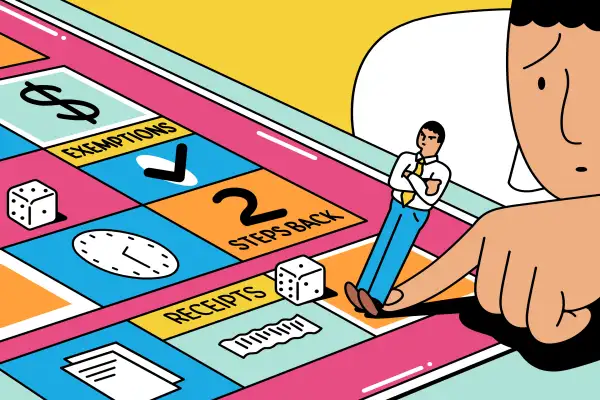'This Big Cloud of Dread': Even Accountants Hate Doing Their Taxes

Each spring Jim Lundy gives up his weekends to file taxes for his clients, but there’s a secret most of them don’t know: He hates doing his own. “It’s like you use up all your energy on your clients’ tax returns and the last thing you want to do is go to work on your own,” says Lundy who works for Marcum LLP out of the Nashville office.
To ease the stress, he files an extension and saves the process for football season in late fall. Often, he’ll organize the paperwork while spending an afternoon drinking a beer and watching a game. “I won’t focus as hard on mine as I do a client’s,” says Lundy who adds that his least favorite part of the process is informing his wife how much they owe for the year.
While most accountants are excited to fiddle with numbers on a daily basis and handle client relationships, many dread the opposite: going home to gather their own documents, track down receipts and calculate how much they personally owe to the IRS. Even as CPAs work with others to meet deadlines, most are dragging out the process when it comes to their own return. And nearly all admit to filing an extension to send them on the last possible day — October 15.
It shouldn’t be surprising that even accountants don’t enjoy doing their own taxes — even if they do it for a living, says therapist Matt Lundquist, founder of Tribeca Therapy in New York. “More than anything, they are miserable to do,” he says. Even accountants have a difficult time gathering the necessary documentation and share in the anxiety of folks who outsource the process.
Mary McDonald, a CPA in Duluth, Minn., says she dislikes her own taxes because there’s no gratification after she’s completed them. McDonald’s favorite part is working with young families to help them maximize tax savings — her own taxes don’t have the same kind of appeal. “I look at our stuff and it’s boring,” she says.
For her, that’s all the more reason to put them off. McDonald says she spends months just glancing at the tax document folder that her husband of 26 years intentionally leaves on the dining room table. The unopened folder serves as a not-so-subtle reminder for her to get it done. “It’s really a ‘death by a thousand papercuts’ sort of thing,” says McDonald. “It’s this big cloud of dread just sitting there.”
But the procrastination and avoidance of accountants can also tell a bigger story for those in almost any career, adds Dr. Lundquist. People generally tend to put their own needs on the backburner even if they are the ones with the expertise — be it dentists who don’t see a dentist or chefs who rarely cook for family at home. “People [often] struggle with valuing themselves and so make others' needs more important,” he says.
Kurt Copeland says he’s managed to turn his procrastination into a tradition of sorts by filing his return dead last for the last 20 years. This year, the senior manager at Sol Schwartz and Associates in San Antonio, Texas plans to do it again. “When I file my return, I know the season is truly over,” he says. “It’s my victory at the end.”
Marianela Collado, chief executive of Tobias Financial Partners in Fort Lauderdale, admits to nearly calling it quits on completing her own taxes this year. The annual process had gotten so bad that she wanted to outsource it. But after realizing that she’d still need to present the dreaded expenses and other documents in a timely manner to avoid holding up the hired accountant, she changed her mind. “I realized…that’s going to be even more pressure,” she says. “I don’t want to be that client.”
Instead, Collado says she has to psychologically prepare for gathering the documents, especially when it comes to recalling what she spent on fixing her rental property. “I’m never motivated and usually I have the situation that I owe,” says Ms. Collado. “It really does become a dreaded project.”
Not everyone dreads the entire process.
Francine Lipman, a CPA and tax law professor at the University of Nevada Las Vegas, says she’s managed to outsource the least enjoyable part of doing her taxes to someone as invested in her taxes as she is: her CPA professor husband.
Each year, Dr. Lipman watches her partner, James Williamson a CPA and accounting professor emeritus at San Diego State University, insist on balancing the checkbook to the cent by hand and then creating tax files for their businesses, which include a farm. “He has an 18-column spreadsheet and adds up all the columns, which drives me crazy,” she says.
But after the numbers gathering part is done, Lipman says she enjoys completing their joint tax forms and takes pride in the finished product. Another perk? It’s free. “We spend many many hours -- I can’t imagine how much we’d have to bill.”
More from MONEY:
Answers to All Your 2021 Tax Questions, From Stimulus Checks to New Deductions
'I Can Do This Myself.' A New Generation Is Ditching Convention and Changing How America Buys Homes